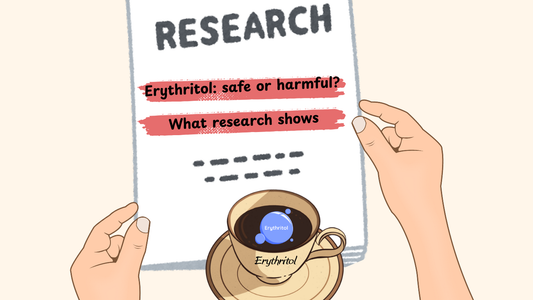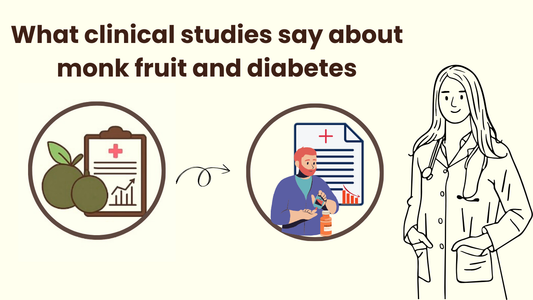Introduction: The Sweet Escape That Backfired?
For decades, artificial sweeteners like aspartame, sucralose, saccharin, and acesulfame-K have been sold as the perfect solution: all the sweetness, none of the sugar. They were everywhere - in diet sodas, “sugar-free” biscuits, protein shakes, chewing gum, and even medicines.
The promise was clear: cut calories, lose weight, avoid diabetes.
But in recent years, research has begun to raise tough questions. Scientists are asking: are artificial sweeteners really the safe sugar escape they were marketed as? Or have we misunderstood their long-term impact?
How Artificial Sweeteners Became Popular
-
Saccharin (1879): First artificial sweetener, used during wartime sugar shortages.
-
Aspartame (1981): Marketed as safe and tasty, widely adopted in diet sodas.
-
Sucralose (1990s): “Made from sugar” - positioned as natural and safe.
-
Acesulfame-K: Added to blends for stability and sweetness.
They’re 100–600 times sweeter than sugar, meaning only tiny amounts are needed. They contain zero calories because the body doesn’t fully metabolize them.
👉 For decades, these sweeteners were seen as the saviors of diabetics and dieters.
Why Scientists Are Rethinking Them
1. Gut Microbiome Concerns
Recent studies suggest that artificial sweeteners may disrupt gut bacteria.
-
A 2014 study in Nature showed that saccharin altered the microbiome in mice, leading to glucose intolerance.
-
Other research found sucralose reduced beneficial gut bacteria in humans.
-
Since the gut controls digestion, immunity, and even mood, this is a major red flag.
👉 The gut may not recognize artificial sweeteners as harmless.
2. Blood Sugar & Insulin Response
Artificial sweeteners were expected to have zero effect on blood sugar. But some studies say otherwise.
-
A 2022 Cell study showed sucralose altered blood glucose control in certain individuals.
-
Aspartame may also influence insulin signaling indirectly.
-
Response varies - some people remain unaffected, others show measurable changes.
👉 It’s not as simple as “no sugar, no effect.”
3. Weight Loss Paradox
Ironically, people who drink the most diet sodas often struggle the most with weight.
-
Some research suggests artificial sweeteners may increase cravings by confusing the brain: sweetness without calories leads to higher hunger later.
-
Meta-analyses show mixed results - some studies find benefits for weight control, others show no effect or even weight gain.
👉 Artificial sweeteners may not solve the obesity crisis as hoped.
4. Safety Debates
-
Aspartame: In 2023, the WHO’s cancer research arm (IARC) classified aspartame as “possibly carcinogenic,” while another WHO body (JECFA) said it’s safe within daily limits.
-
Sucralose: Some lab studies suggest DNA-damaging effects at high concentrations, but regulators still allow it.
-
Saccharin: Once banned for cancer risk in rats, now considered safe in moderate use.
👉 Official agencies say they’re safe, but headlines raise consumer doubts.
Why the Science Is Complicated
-
Dose matters: Most negative effects appear at very high doses in lab settings.
-
Individual response: Some people are more sensitive than others.
-
Comparisons matter: Artificial sweeteners may be safer than sugar, but not necessarily 100% neutral.
This is why scientists are rethinking - not banning. The picture isn’t black and white.
What the Future of Research Looks At
-
Gut Health Studies → Long-term human trials on microbiome effects.
-
Metabolic Pathways → Do sweeteners trick the body into craving more food?
-
Cancer Links → More clarity on aspartame and sucralose safety.
-
Comparisons With Natural Alternatives → Monk fruit, stevia, allulose, erythritol.
👉 The new question isn’t “are they safe?” but “are they the best we can do?”
Artificial Sweeteners vs Natural Alternatives
-
Artificial (Aspartame, Sucralose, Saccharin): Cheap, stable, widely used, but with trust issues.
-
Natural (Stevia, Monk Fruit, Erythritol): Plant-based, cleaner image, fewer concerns.
Research shows monk fruit mogrosides are metabolically neutral and don’t harm gut health. Erythritol is absorbed but not metabolized, passing harmlessly.
👉 This is why scientists are shifting focus from “synthetic” to “natural” sugar alternatives.
The India Context
In India, “sugar-free” tablets for chai are popular, almost always made with aspartame, sucralose, or saccharin. But trust is low. People want “natural” and “traditional.” That’s why jaggery, honey, and brown sugar are still seen as better - even though they aren’t.
👉 The opportunity? Educating Indians about real natural sugar alternatives like monk fruit — zero sugar, zero glycemic index, safe for diabetics.
Where EPRA Farms Stands
At EPRA, we’re not against artificial sweeteners - but we believe the future lies in natural, clean sweetness.
-
Our monk fruit blends contain only monk fruit + erythritol.
-
No aspartame.
-
No sucralose.
-
No saccharin.
👉 Just clean sweetness, backed by science, safe for diabetics and families.
FAQs
Q: Are artificial sweeteners safe or not?
Regulators say yes, but research shows they may not be metabolically neutral. The debate is ongoing.
Q: Should diabetics use them?
They’re safer than sugar, but natural sweeteners like monk fruit are better long-term.
Q: Is Diet Coke safer than regular Coke?
It has no sugar, but still contains aspartame/acesulfame-K. It’s better than sugar cola, but not “healthy.”
Q: Which sweetener has the cleanest record?
Monk fruit and erythritol currently have the strongest safety and trust profile.
Conclusion: Rethinking the Sweet Escape
Artificial sweeteners gave us an exit from sugar, but not a perfect one.
-
They may affect gut health.
-
They may confuse metabolism.
-
They haven’t solved obesity.
That’s why scientists are rethinking - not rejecting, but questioning whether better, cleaner options exist.
👉 The future of sweetness lies in natural compounds like monk fruit, allulose, and rare sugars that don’t just remove harm, but may even add health.
And at EPRA Farms, we’re already part of that future.





